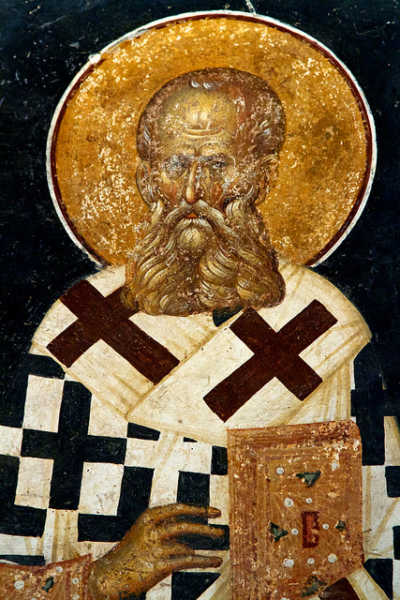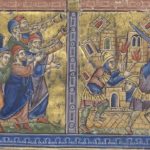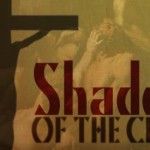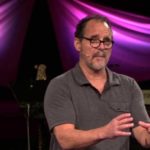We run our website the way we wished the whole internet worked: we provide high quality original content with no ads. We are funded solely by your direct support. Please consider supporting this project.

How the Church Fathers Read the OT
After the completion of the New Testament, the church fathers developed theology in their increasingly Gentile post-apostolic church in such a way that many of the distinctively Jewish features of the NT’s use of the OT diminished. However, this was not the case with regard to the Christocentric interpretation of the OT that was so central to how the NT writers interpreted the OT. As noted historian, Robert Wilken, has noted, the early church fathers didn’t consider the original meaning of OT passages to be altogether irrelevant, but they did consider it merely “preparatory” for the fuller meaning of passages that was unlocked when they were read in the light of Christ. The distinctly “Christian understanding” of Scripture was for them “oriented toward the living Christ revealed through the words of the Bible…”[1]
For these believers, writes Denis Farkasfalvy, “Jewish holy books function and are interpreted as documents of a Christ-centered salvation history with its full and true meaning apparent only in the light of the Church’s faith in Christ.”[2] Indeed, according to Claire McGinnis, “[n]ot only did the NT serve as the key to understanding the Old” for these fathers, but the uniform assumption of interpreters during this period was that “the books of the Old were about Christ.”[3] Following the precedent of the NT, these fathers understood Christ to be the fulfillment of fundamental OT motifs as well as of specific OT prophecies.
Following this precedent, these fathers relied on typological as well as allegorical interpretive strategies to discern Christ in the OT. It was by this means that Origen, Gregory of Nyssa, John Cassian and others were able to discern how violent portraits of God in the OT bore witness to Christ, as argued in The Crucifixion of the Warrior God.
By means of creative Christocentric interpretive strategies such as these, the Bible became for these interpreters “a vast field of interrelated words, all speaking about the same reality, the one God revealed in Christ,” as Wilken notes. The central goal of early Christian interpreters, he continues, was “to find Christ in surprising and unexpected places.” [4] And it was primarily by this means that the early Church was able to continue to embrace the OT as its own.
[1] R. L. Wilken, “Interpreting the Old Testament,” Isaiah: Interpreted by Early Christian and Medieval Commentators, trans. and ed. R. L. Wilken, A, R. Christman, and J. Hollerich; The Church’s Bible, xvii.
[2] Denis Farkasfalvy, Inspiration and Interpretation, 23.
[3] Claire McGinnis. “Stumbling over the Testaments: On Reading Patristic Exegesis and the Old Testament in Light of the New,” Journal of Theological Interpretation (April, 2010), 15-31.
[4] Wilken, “Interpreting the Old Testament,” xviii.
Photo credit: Nick in exsilio via Visual Hunt / CC BY-NC-SA
Category: General
Tags: Bible Interpretation, Church Fathers, Cruciform Theology
Related Reading

Why Does Jude Say Jesus Killed Disobedient Israelites? (podcast)
Greg defends Jesus’s non-violence against Jude 1:5, which suggests that Jesus killed disobedient Israelites. Episode 588 http://traffic.libsyn.com/askgregboyd/Episode_0588.mp3

Reading the Bible “by Faith”
The cruciform approach to reading the Bible—and specifically the culturally-conditioned and sin-stained portraits of God—requires faith on the part of the reader, which I argue in Crucifixion of the Warrior God. On one level we can discern by faith that often times God broke through the limitations and sin of the ancient authors, for we…

Sermon 7/22/12: The Shadow of the Cross
In his sermon this past Sunday, Greg continued his fleshing out thoughts from the previous week on how he reconciles the violent, disturbing portraits of God in the Old Testament with the revelation of God in Jesus Christ on the Cross. He answers a question raised by several in response to last week’s sermon: Did God actually engage…

Revolting Beauty
In this sermon clip, Greg shares the story of how foster parents entered into the pain of a severely abused child and demonstrated compassion rather than judgment when she displayed puzzling and revolting behaviors. This moving story illustrates the way that God enters into our sin and our curse on the cross, and gives us…

A Revelation of Beauty Through Ugliness
In my recent post, Getting Honest About the Dark Side of the Bible, I enlisted no less an authority than John Calvin to support my claim that we need to be forthright in acknowledging that some of the portraits of God in the OT are, as he said, “savage” and “barbaric.” What else can we…

Podcast: Would a Loving God Create a Box that Killed Anyone Who Touched It?
Greg discusses the Ark of the Covenant and it’s strange and violent nature. http://traffic.libsyn.com/askgregboyd/Episode_0266.mp3
